
Art & Culture
|
President Patil confers Padma Bhushan on Dr Ramdas PaiBy Deepak Arora
Dr. Ramdas Pai has been at the helm of the Manipal Education and Medical Group for over three decades. Dr. Ramdas Pai, son of the legendry/illustrious founder of Manipal University, Dr. TMA Pai, has played a key role in transforming the Manipal Education and Medical Group into a leading player in the Healthcare and Education sector. He has received several business awards during his distinguished career and has been honoured in recognition of his community service. He was chosen by Ernst & Young as the “Entrepreneur of the Year” in the services category recently. Dr. Pai spearheaded the expansion plans of the Manipal Group. It was under his leadership that Manipal set up various campuses across the globe including Nepal, Malaysia and the UAE. Dr. Pai was instrumental in conceptualizing, articulating and implementing the Global Delivery Model of Education in Manipal. In terms of providing quality medical care, Dr. Pai’s leadership has shaped the Group’s future by expanding from a single Manipal Hospital in Bangalore in 1991 to a multi-location chain of eleven hospitals across seven cities in South India, and rated amongst the best in the country. Under Dr Pai’s guidance, Manipal today has the largest number of medical schools in the country. A medical graduate of Karnataka University and a postgraduate in Hospital Administration from Temple University, Philadelphia, USA, Dr Ramdas Pai has held several prestigious positions at national level. He was a past member of the Core Group constituted by the Govt. of India to report on the new initiatives on higher education. The Government of India has recently nominated Dr. Pai as a member of the National Integration Council (NIC), newly re-constituted by the Hon’ble Prime Minister of India. Dr Pai's nomination is recognition of his stature and his personal convictions on such important matters. His name has also been proposed by the Hon’ble Prime Minister of Antigua and Barbuda for appointment as that country’s first Honorary Consul General in India. Dr. Ramdas Pai’s philanthropreneurial efforts are now channelled through Manipal Foundation. This Foundation, set up by him, keenly pursues several developmental activities, from offering scholarships and freeships worth Rs. 15 crore for meritorious students, to running unique maternal and child welfare homes for the rural population in the region, right upto sponsoring free heart surgeries for children belonging to the lower socio-economic strata. ‘Manipal Arogya Card’, the unique health insurance scheme of Manipal Foundation, covers over 1,00,000 people who live below the poverty line. Kalam’s 4-point formula for successBANGALORE, March 31: Former President APJ Abdul Kalam presented a four-point formula for the 478 graduating students of the Brindavan Group of Institutions on Thursday. Second, Kalam went on, is to acquire the right knowledge. He narrated how India’s pioneer aerospace engineer Satish Dhawan taught him the nuances of developing contra-rotating propeller. Third, Kalam said, is to work hard towards one’s goal. Last, but not the least, one should learn to manage his/her failures. In 1979, a team at the Defence Research and Development Organisation (DRDO) led by Kalam had failed to launch the rocket into orbit. “But within a year, we rectified the problems and the satellite was put into orbit,” he said. The building of the Brindavan College of Engineering was inaugurated. Minister for Higher Education V S Acharya, KPCC President G Parameshwar, NAAC Director H A Ranganath and others spoke. The world’s first artificial leaf ‘created’WASHINGTON, March 29: Scientists have created the world’s first practical artificial leaf that can turn sunlight and water into energy, which they claim could pave the way for a cheaper source of power in developing countries like India. A team at Massachusetts Institute of Technology says that the artificial leaf from silicon, electronics and various catalysts which spur chemical reactions within the device, can use sunlight to break water into hydrogen and oxygen which can then be used to create electricity in a separate fuel cell. “A practical artificial leaf has been one of the Holy Grails of science for decades. We believe we have done it. And placed in a gallon of water and left in sun, these artificial leaves could provide a home in the developing world with basic electricity for a day,” Daniel Nocera, who led the team, said. He added: “Our goal is to make each home its own power station. One can envision villages in India and Africa not long from now purchasing an affordable basic power system based on this technology.” For their research, the scientists identified a set of inexpensive, common catalysts including nickel and cobalt that get the job done with far less expense. And, in the laboratory their playing-card-sized leaves have worked continuously for 45 straight hours without a drop in output. Though in laboratory, an artificial leaf prototype could operate continuously for at least 45 hours without a drop in activity, the scientists say that they will next try to boost both efficiency and lifespan of their photosynthetic material. The findings were presented at the National Meeting of the American Chemical Society. The King’s Speech - Overwhelming favourite at the Oscars
The film is such a favourite in the best picture category that the big question among pundits is how many other Oscars the 12—time nominated film will garner. Few could have predicted such success for the British movie — least of all its stars. After all, the trials and tribulations of a stuttering king do not really have much sex—appeal. “It just didn’t feel like a thing that people would want to go and see,” co—star Geoffrey Rush conceded. Yet, made for just 15 million dollars, The King’s Speech has had an amazing art house run, earning some 200 million dollars worldwide already. In the film, Colin Firth plays Britain’s King George VI, a lifelong stutterer who is forced to take the throne on the eve of World War II after his elder brother’s scandalous abdication. He engages the services of an unconventional Australian speech therapist, played by Rush, and they develop a powerful bond that enables the king to overcome his impediment and inspire his country to victory over the Nazis. Now, everyone is tabulating its omens for success Sunday night when actors Anne Hathaway and James Franco host an Oscars ceremony that will be watched by hundreds of millions of film fans around the globe. The King’s Speech is the leading Oscar nominee with 12 nods from the Academy of Motion Picture Arts and Sciences. Oscar voters have a history of supporting movies where the characters speak in plumy British accents. The movie is produced by those masters of Oscar lobbying, Bob and Harvey Weinstein. It has dominated many of the other awards show already this season. According to the bookmakers, it is the hottest favourite of all time to scoop the best film award, with British bookies William Hill posting odds of 1:6. There are many reasons for the film’s critical success. But at its core is a story that works on many levels. Start with the glamour of the British royal family — contrasted with the human frailty and insecurity of the king. Throw in the burgeoning and unlikely friendship between the king and his tutor, two men who bridge divides of class and country to form their bond. Then there’s the humanization of the film’s central protagonist and the epic context of the king’s personal struggle. And, most importantly, we also have a happy ending tailor—made for Hollywood. The film’s most prominent best—picture rivals, The Social Network and True Grit, cannot even begin to check all these boxes. The Social Network, about Facebook founder Marc Zuckerberg, did win the Golden Globe for best drama but was beaten by The King’s Speech in the three most important indicators: the awards shows by the directors, actors and producers guilds, whose members are also the people who vote for the Oscar winners. True Grit, on the other hand, looks set to continue its role as a top nominee but never a winner, especially because the film’s creators, the Coen Brothers, were honoured by the Academy for No Country for Old Men in 2008. While Firth is a shoo—in for best actor — and the movie looks certain to win best picture — director Tom Hooper is expected to be strongly challenged by the Social Network’s David Fincher, while Rush could be pushed all the way by Christian Bale from The Fighter for the supporting actor Oscar. True Grit’s young star, Hailee Steinfeld, is expected to beat Helena Bonham Carter in the supporting actress category, while Annette Bening from The Kids Are All Right and Natalie Portman from The Black Swan are considered favourites for best actress. Selja opens 'Treasures of Ancient China' expo in Delhi
Speaking on the occasion, Kumari Selja said the Cultural exchanges between the two nations, so rooted in history, now fructifies through the art exhibitions. She said such joint ventures help strengthen and grow the bond of affection between people of our countries. She said, we are readying with the second exhibition on Tagore paintings and Secretary Culture, Govt. of India and Ambassador of China to India will work out details in this regard. The year 2006 was declared “Indo-China Friendship Year”. As a significant component of the yearlong celebration in this context, an exhibition on “Treasures of Ancient India” was organized in 2006-07 at four venues in China-Beijing, Zhengzhou, Chongqing and Guangzhou. One hundred exquisite Indian art objects ranging from 3rd century BC to 18th Century AD, representing Hindu, Buddhist and Jain pantheons and made in stone, metal, ceramics etc. were mounted on display to present a microcosmic view of Indian art and culture. In reciprocation thereof, an exhibition on “Treasures of Ancient China” is being organized in 2011 in India. The exhibition has been organized by Archaeological Survey of India in collaboration with the State Administration of Cultural Heritage of China and Art Exhibitions China as its executing agency. Ninety-five Chinese artefacts will be showcased representing Chinese culture from the Neolithic period (about 10,000 BC) to the Qing dynastic period and made in different art media like stone, metal, jade, porcelain, ceramics, etc. A catalogue on the exhibits with their photograph and short description in three languages (English, Hindi and Chinese) has been published. In addition a brochure on the exhibition has also been brought out delineating history of Indo-China cultural interaction and the significance of major categories of Chinese antiquities. Chief attractions of the exhibition are the bronzes, jade objects, sculptures, porcelain, gold objects, etc. The terracotta warriors and the tri-coloured pottery, which are distinguishing objects of Chinese art, add special charm to this exhibition. Since last two millenniums, India and China, located across the towering Himalayas, have interacted mutually and together have influenced Asia and even the world making outstanding contribution in the field of art and culture. The ancient silk route and the introduction of Buddhism from India to China were some important connections triggering landmark development in mutualism. The traders and monks of one country have always moved to the other country. Fa-Hien (4th century AD), Hiuen Tsang (7th century AD) and I-Tsang (10th century AD) are some important Chinese travellers to India whose travel accounts form important basic source materials for Indian history. Indian monks Kasyapa Matanga and Dharmaraksha went to China in 68 AD on white horses carrying Buddhist scriptures and established the first Buddhist temple in China namely the White Horse Temple at Luoyang, then China’s Capital. The present exhibition is aimed at refreshing the cultural dialogues and thereby strengthening the friendship between the two great republics of Asia by establishing people to people contact. The exhibition is currently on display at the National Museum, New Delhi till 20th March 2011. Rahat, manager slapped a penalty of Rs. 15 lakh each
The two would be allowed to leave the country only after they pay the penalty imposed by the Customs Department, sources said. Rahat, his manager Maroof and event manager Chitresh Shrivastava were detained by the DRI sleuths when they, along with other members of their troupe, were on their way to board a flight to Dubai on February 13. The agency purportedly found $24,000 each in the possession of Maroof and Chitresh. The money was much above the permissible limit of $5,000 in cash and like amounts in other instruments. The matter was recently forwarded to the adjudicating authority, Commissioner of Customs (Airport), for further action under the Customs Act. Earlier, the role of foreign exchange agents and some prominent Bollywood figures had come under the scanner during the investigation by the DRI. The suspected use of unauthorised channels for money transfer was also probed. Rahat, a famous playback singer, had recently won the Filmfare Award for best male playback singer for his song Dil To Bachcha Hai Ji from the movie Ishqiya. He has won several other prestigious awards this year. Pakistan seeks release of singer Rahat Fateh Ali KhanISLAMABAD, Feb 14: Pakistan has initiated hectic efforts to secure the release of famous singer Rahat Fateh Ali Khan detained at New Delhi's Indira Gandhi International Airport on charges of carrying undisclosed foreign currency. Foreign secretary Salman Bashir called Indian high commissioner in Islamabad Sharat Sabarwal and discussed the matter around midnight Sunday. He requested the Indian envoy to ensure that "no official should misbehave with Rahat during interrogation". Rahat was detained at the Delhi airport on Sunday on his way back to Pakistan after attending concerts and award functions in India. More than $100,000 were recovered from the 15-member troupe. After over six hours of interrogation by customs officials, he was formally arrested and would be presented in a court on Monday morning. Bashir also called up Pakistani high commissioner to India Shahid Malik and directed him to "take immediate steps for securing release of Rahat". "The matter should be taken up formally with Indian foreign office," he said, adding that "contact with Indian authorities for updates in the case must be maintained throughout". Earlier, interior minister Rehman Malik called Shahid Malik and directed him "to provide necessary legal and other consular help to Rahat". "Regular updates should be given to authorities in Pakistan regarding efforts to resolve the case," he stressed. Rahat's brother-in-law, Asim Raza, said they "received information from the media and were feeling concerned about it". "We are yet to establish any proper contact with the authorities in India although Rahat talked briefly with his wife and asked her to remain hopeful of a positive outcome". Rahat, the nephew of legendary singer Nusrat Fateh Ali Khan, is popular both in India and Pakistan. Several of his hit songs from Indian films are a rage on both sides of the border, for which he has won several awards, including the recent Filmfare award for Dil To Bacha Hai Jee. President releases book on Dr Iqbal SinghBy Deepak Arora
The book is compilation of the speeches of Puducherry Lt. Governor, Dr. Iqbal Singh, delivered in the first year of his office. The book is interspersed with photographs giving glimpses of the public life of the Lt. Governor.
Rajya Sabha Deputy Chairman Rahman Khan, Chief Secretary to Puducherry Government R. Chandramohan, wife of the Lt Governor, OSD to Lt. Governor J. P. Singh and book publisher Pramod Kumar Aggarwal were present at the book release function. The two sons of Dr Iqbal Singh were also present on the occasion. Veteran vocalist Pt Bhimsen Joshi dead
A recipient of Bharat Ratna, the highest civilian award, Joshi had been put on life support system following old age- related ailments leading to kidney and respiratory failure after his admission to hospital on 31st December, his family said. Joshi, the most-celebrated exponent of 'Kirana gharana' of Khansahib Abdul Karim Khan, leaves behind three sons and a daughter. A pall of gloom descended on the city as the news of his demise spread with people making a beeline to his residence to pay their last respects to the singer who was the most powerful figure on the Hindustani music concert platform of 'khayal gayki'. Born on 4th February, 1922 at Gadag in Dharwad district of Karnataka, Joshi got a boost to his career during a concert in Pune in January 1946 on the occasion of the 60th birthday of his guru Sawai Gandharva. He was 87. What distinguished him from the ordinary was his powerful voice, amazing breath control, fine musical sensibility and unwavering grasp of the fundamentals that made him the supreme Hindustani vocalist, representing a subtle fusion of intelligence and passion that imparted life and excitement to his music. In the forays he made outside the classical fold, Joshi lent is voice as a "dhrupad" singer for a Bengali film based on the life of Tansen and later sang as a playback singer for Marathi film "Gulacha Ganapati", produced and directed by celebrated Marathi humorist "Pu La" Deshpande in addition to Hindi movies "Basant Bahar" and "Bhairavi". But it was his 'Sant Vani' recitals, which bore the flair of Marathi 'Bhakti Sangeet' that added immensely to his popularity in both Maharashtra and Karnataka which have had a long succession of saint-poets. He was honoured with the Padma Shri (1972), Sangeet Natak Akademi award for Hindustani vocal music (1975), Padma Bhushan (1985) and Madhya Pradesh government's "Tansen Samman" in 1992. Bharat Ratna was bestowed on him in 2008. Joshi had undergone a surgery for removal of a brain tumor in 1999 followed by a cervical spine operation in 2005. The maestro's last surprise public performance that regaled the audience was during 2007 'Sawai Gandharva' annual music festival which he himself had started to commemorate the memory of his guru. Rob Lynes is British Council’s New Director in India
Rob Lynes is a trained linguist who studied Russian, Polish and Hungarian and has spent a number of years in Eastern Europe. During his tenure as Regional Director of the Middle East Rob was responsible for strengthening the educational and cultural links across the region including the reopened British Council centre in Iraq. Dip in Indian students going to Australia: Peter Varghese
Speaking to newsmen here, Mr Varghese said “For the last 18 months, the situation (Indian students going to Australia for studies) is disturbed, but it will bounce back soon.” He said that there had been a “large reduction” in Indian students going to Australia, but did not spell out any figures. He, however, said that it should not be linked to incidents of attacks on Indians and attributed the trend to changes in Australia’s immigration policy. “There were private vocational courses of cookery and hair dressing that led to Permanent Residency (PR), but it is not so now,” the Australian High Commissioner said. Over 100 incidents of attacks on Indians in Australia have been reported since June 2009. The envoy said, “There were some racial attacks.... We condemn these ...but it would be a mistake to conclude that every incident was racial.” He listed a number of steps taken by authorities, including increasing police patrolling and briefing Indian students, to check attacks on foreign students. “Unlike the earlier generation of Indian students, the present students are going for vocational programmes that lead to permanent residency,” he said, adding that they were involved in occupation with higher risks and also living in criminal infested areas as it was cheap there. He said that between 20 to 30 institutes in Australia had been closed down for not providing adequate services to the students. The envoy said that there were three lakh people of Indian diasporas in Australia and the government was going to start a special promotion campaign next year focusing on Indian students. “We will conduct seminars in Chandigarh and other northern cities as part of promotion campaign,” he said. The High Commissioner pointed out that the proportion of international students to local students was much higher in Australia than in any part of the world. He said that the new immigration policy of Australia was demand driven instead of supply driven. |
|
|||
Aviation
| Business | Defence
| Foreign Affairs | Communication
| Health | India |
United Nations
India-US | India-France
| Entertainment | Sports
| Photo Gallery | Tourism
| Advertise with Us | Contact
Us
© Noyanika International, 2003-2009. All rights reserved.
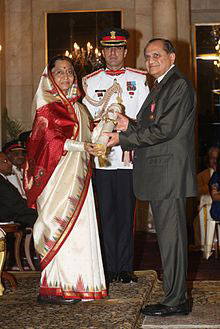 NEW DELHI, April 1: Dr Ramdas Pai, Chairman of Manipal Education and Medical Group, received the Padma Bhushan from Smt. Pratibha Devisingh Patil, the President of India, for his contributions to the fields of education, healthcare and literature at a ceremony here today.
NEW DELHI, April 1: Dr Ramdas Pai, Chairman of Manipal Education and Medical Group, received the Padma Bhushan from Smt. Pratibha Devisingh Patil, the President of India, for his contributions to the fields of education, healthcare and literature at a ceremony here today. NEW YORK, Feb 23: Hollywood’s awards season reaches its apex Sunday night at the Oscars — and the royal drama the King’s Speech is expected to continue its dominating run.
NEW YORK, Feb 23: Hollywood’s awards season reaches its apex Sunday night at the Oscars — and the royal drama the King’s Speech is expected to continue its dominating run.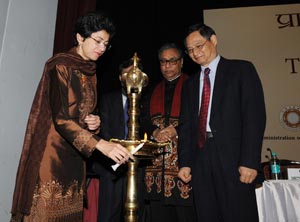 NEW DELHI, Feb 19: The Minister of Culture, Kumari Selja, inaugurated an exhibition “Treasures of Ancient China” in the presence of Zhang Yan, Chinese Ambassador to India and the senior officials and members of State Administration of Cultural Heritage of China and Art Exhibitions China.
NEW DELHI, Feb 19: The Minister of Culture, Kumari Selja, inaugurated an exhibition “Treasures of Ancient China” in the presence of Zhang Yan, Chinese Ambassador to India and the senior officials and members of State Administration of Cultural Heritage of China and Art Exhibitions China. 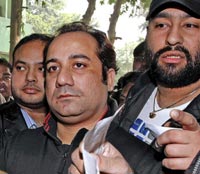 NEW DELHI, Feb 19: NEW DELHI: Pakistani Qawwali (Sufi devotional music) singer Rahat Fateh Ali Khan and his manager have been slapped a penalty of Rs.15 lakh each and the foreign currency found in their possession by the Directorate of Revenue Intelligence (DRI) at the Delhi airport a week ago has been confiscated.
NEW DELHI, Feb 19: NEW DELHI: Pakistani Qawwali (Sufi devotional music) singer Rahat Fateh Ali Khan and his manager have been slapped a penalty of Rs.15 lakh each and the foreign currency found in their possession by the Directorate of Revenue Intelligence (DRI) at the Delhi airport a week ago has been confiscated.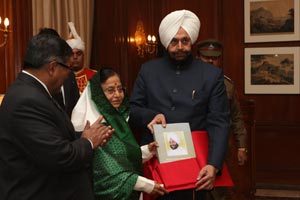 NEW DELHI, Feb 3: President Pratibha Patil released a book titled "Reflections from the Tranquil Land and Beyond" here on Thursday at Rashtrapati Bhavan.
NEW DELHI, Feb 3: President Pratibha Patil released a book titled "Reflections from the Tranquil Land and Beyond" here on Thursday at Rashtrapati Bhavan. 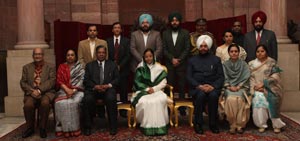 It has been embellished with Foreword by Speaker of Lok Sabha Meira Kumar.
It has been embellished with Foreword by Speaker of Lok Sabha Meira Kumar.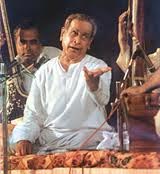 MUMBAI, Jan 24: Legendary vocalist Pandit Bhimsen Joshi, who enthralled generations of connoisseurs with his renditions of Hindustani classical music, passed away at a city hospital on Monday after a prolonged illness.
MUMBAI, Jan 24: Legendary vocalist Pandit Bhimsen Joshi, who enthralled generations of connoisseurs with his renditions of Hindustani classical music, passed away at a city hospital on Monday after a prolonged illness. NEW DELHI, Jan 14: Rob Lynes has been appointed as the new Director of the British Council in India. Previously Rob was Deputy Director (Operations) based at the British Council’s headquarters in London. Prior to that he was the Regional Director of the Middle East based in Dubai.
NEW DELHI, Jan 14: Rob Lynes has been appointed as the new Director of the British Council in India. Previously Rob was Deputy Director (Operations) based at the British Council’s headquarters in London. Prior to that he was the Regional Director of the Middle East based in Dubai. 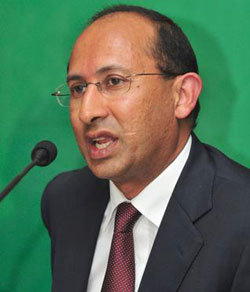 CHANDIGARH, Jan 13: Australian High Commissioner Peter Varghese has said that there has been a “large reduction” in the number of Indian students going to Australia. However, he added that it was not due to the spate of racial attacks against the community there.
CHANDIGARH, Jan 13: Australian High Commissioner Peter Varghese has said that there has been a “large reduction” in the number of Indian students going to Australia. However, he added that it was not due to the spate of racial attacks against the community there.
